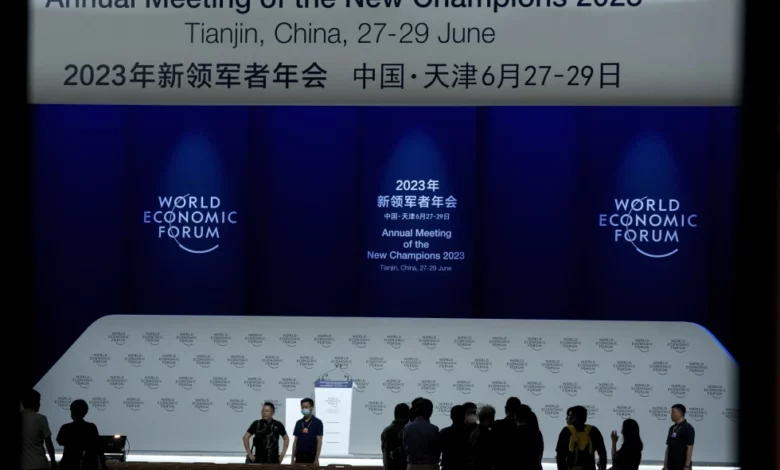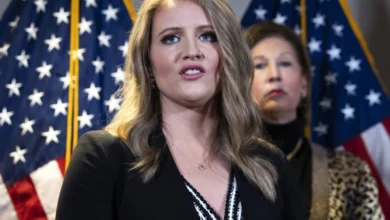
Members of the official media set up their camera position at the plenary hall of the Meijiang Convention and Exhibition Center ahead for the World Economic Forum’s Annual Meeting of the New Champions 2023 in northern China’s Tianjin Municipality, Monday, June 26, 2023. Social media users are sharing a video misrepresenting remarks Eswar Prasad, an economics professor from Cornell University, made at the event about the benefits and the dangers of central bank digital currencies. (AP Photo/Andy Wong)
CLAIM: A video shows a “World Economic Forum agent” calling for a cashless society and saying those determined “less desirable” will be locked out.
AP’S ASSESSMENT: False. The video shows Eswar Prasad, an economics professor from Cornell University, speaking at a June WEF event, but Prasad does not work for or represent the organization. The video misrepresents remarks Prasad made at the event about the benefits and the dangers of central bank digital currencies. Such currencies do not create “cashless societies,” nor did Prasad or the WEF itself ever call for one.
THE FACTS: In the weeks since the World Economic Forum held its annual summer meeting in China last month, some social media users have been taking clips from the event and misrepresenting them online. The organization — best known for its winter gathering of political and business elites in Davos, Switzerland — is a frequent target of internet conspiracy theories.
One recent post shared a clip of Prasad speaking at the June conference with a caption overlaying the video reading: “WEF agent openly telling you the coming digital cashless society will be regulated and those determined ‘less desirable’ will be locked out.”
“The benefits of digital money, there are huge potential gains,” says Prasad, who is speaking in front of the World Economic Forum logo. The clip then cuts to him saying: “You could have, as I argue in my book, potentially better and some people might see a darker world where the government decides that units of central bank money can be used to purchase some things but not other things that are deemed less desirable.”
The video then cuts to a commentator who claims that the World Economic Forum itself “wants to get rid of the dollar.”
“The global cabal are all calling for the cashless society,” reads the caption sharing the video on Instagram. The post has more than 9,000 likes as of Wednesday.
However, Prasad is not employed by the WEF — and the social media post distorts what he actually said at the conference.
The Cornell professor, who studies the digitization of currencies and who is the author of “The Future of Money: How the Digital Revolution Is Transforming Currencies and Finance,” was speaking at the WEF’s Annual Meeting of the New Champions — also known as “Summer Davos” — in a June 28 session about digital currency.
Prasad is not employed by and had not been paid by the WEF, Yann Zopf, a spokesperson for the organization, told The Associated Press in an email.
“The WEF organized the session for me to talk about the themes in my book but had no control over what I said or did not say,” Prasad told the AP in an email. “I was speaking for myself (as an academic) and not for the WEF or any other organization/institution.”
The full video of the event shows that the social media post heavily edits comments Prasad made about potential central bank digital currencies, or CBDCs. These are government-issued digital currencies that would allow people to make electronic transactions without relying on a third party, such as a commercial bank.
As Prasad and other experts have previously explained, governments adopting CBDCs doesn’t mean eliminating cash. They offer an alternative to existing digital payment options, which usually need to be linked to a bank account or credit card.
During the WEF session, Prasad was asked about the risks that come with a CBDC, and the pros and cons for governments thinking about a CBDC.
“If you think about the benefits of digital money, there are huge potential gains. It’s not just about digital forms of physical currency, you can have programmability units of central bank currency with expiry dates,” he says in the longer clip.
“You could have, as I argue in my book, potentially better and some people might see a darker world, where the government decides that unit, so central bank money can be used to purchase some things but not other things that are deemed less desirable, like, say, a munition or drugs or pornography or something of the sort. And that is very powerful in terms of the use of a CBDC and I think also extremely dangerous for central banks,” he continues.
Prasad clarified to the AP that the points he was making in the video are that digital technologies, including CBDCs and other digital currencies, could lead to positive effects such as more financial inclusion and more efficient services, but without safeguards they could be misused in a malicious manner.
But, Prasad noted, he was only speaking hypothetically. “No central bank is contemplating any such uses for its CBDC but, as an academic, it is important for me to point out all the possibilities and potential—both good and bad—of a world in which all payments are digital and anonymity might be limited (relative to the use of cash),” Prasad wrote to the AP.
The WEF has published an explainer discussing central bank digital currencies, covering its potential benefits and problems. It has also published multiple articles by contributors that mention “cashless” societies, including one titled “The benefits of a cashless society” in 2020, along with others that highlight potential problems.
Regardless, the WEF itself has never called for an “end of the dollar” nor for a completely cashless society, Zopf told the AP in an email.
Last year, social media users spread similar false claims about an executive order from President Joe Biden urging the Federal Reserve to consider whether it should create a CBDC. Prasad explained at the time that the Fed was just introducing the subject of digital currency but was nowhere near implementing one.




